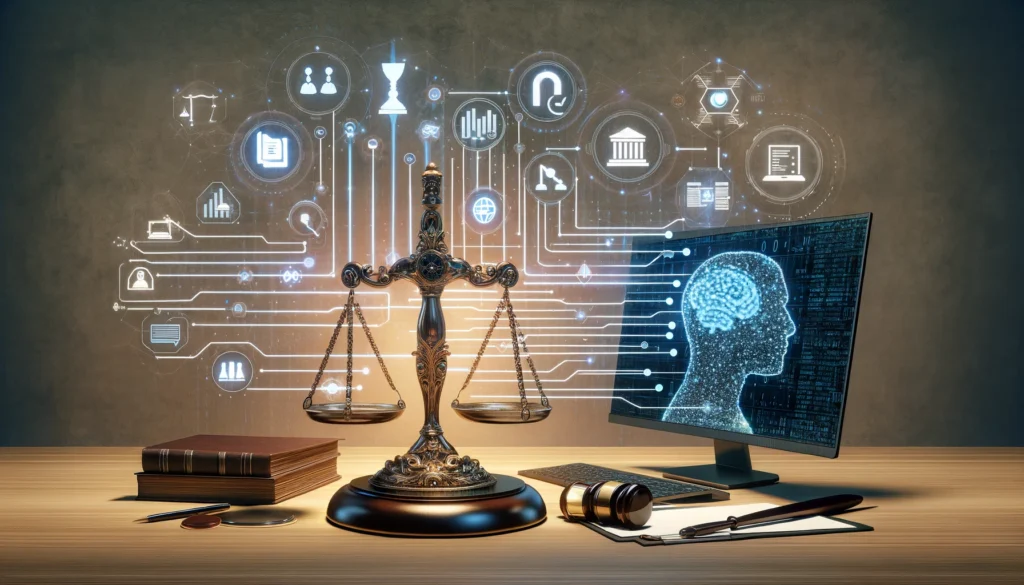
Empowering Paralegals in the Digital Age
The role of paralegals is evolving rapidly in today’s digital age. Traditionally tasked with legal research and administrative support, paralegals now find themselves at the forefront of technological advancements in the legal sector. Mastering AI tools, particularly for legal research, has become crucial for paralegals aiming to enhance their efficiency and effectiveness. Understanding and utilizing tools like ChatGPT can significantly streamline the research process, enabling paralegals to focus on more critical tasks.
As we transition into discussing the game-changing implications of ChatGPT, let’s explore why this AI tool has become indispensable in the modern legal landscape.
Why ChatGPT is a Game-Changer
ChatGPT, developed by OpenAI, represents a significant leap forward for the legal sector. As a large language model (LLM), ChatGPT can analyze and interpret vast amounts of legal information quickly and accurately, making it a valuable asset for legal research. The capabilities of ChatGPT and similar LLMs empower legal professionals to sift through documents, case laws, and statutes with unprecedented speed and precision.
Key advantages of using AI for legal research include:
- Efficiency: Rapidly processes and interprets extensive legal data.
- Cost-Effectiveness: Reduces the time and resources needed for manual research.
- Consistency: Ensures consistent results based on trained data sets.
Having established why ChatGPT is transformative, let’s now delve into the art of crafting the perfect prompt for optimal results.
Crafting the Perfect Prompt: A Primer
At the heart of effectively using ChatGPT lies the skill of crafting precise and clear prompts. Understanding the basics of prompt formulation is paramount, as poorly constructed prompts can lead to incomplete or irrelevant answers. Here’s a quick primer:
- Clarity: Ensure the prompt is direct and specific. For example, instead of asking, “What are the laws about employment?” specify, “What is the statute of limitations for wrongful termination claims in California?”
- Context: Provide background information to give ChatGPT a clear frame of reference.
- Focus: Narrow down the query to avoid overly broad responses.
Common pitfalls include vague language, lack of specificity, and ambiguous terms. Avoid these by refining your prompts through iterative testing and clarification.
With these basics in mind, we’ll now explore advanced techniques for handling more complex legal queries.
Advanced Prompt Techniques for Complex Queries
For complex legal queries, advanced prompt techniques can enhance the comprehensiveness and accuracy of ChatGPT’s responses. Here are some strategies:
Layered Questioning for In-Depth Analysis
Break down intricate questions into layered, sequential queries. Instead of asking a single multifaceted question, pose a series of related inquiries. For example:
1. “Identify the key cases related to the doctrine of estoppel in contract law.”
2. “Summarize the legal principles established in these key cases.”
3. “How do these principles apply to hypothetical Scenario X?”
Using Hypothetical Scenarios for Predictive Insights
Leveraging hypothetical scenarios can yield valuable predictive insights, useful in formulating legal strategies. For instance:
“Assume a company violates a non-compete agreement in State Y. Predict potential legal consequences based on past case law and statutory provisions.”
Applying Boolean Logic in Prompts
Employing Boolean logic in prompts can narrow down searches and refine results. Combining keywords with operators like AND, OR, and NOT can transform queries:
- Example Prompt: “Show cases involving ‘data breach’ AND ‘negligence’ NOT ‘dismissed’.
Using these techniques will ensure comprehensive and targeted results, saving time and ensuring a deeper understanding of complex legal issues.
Next, let’s explore some time-saving hacks for routine tasks that will further enhance your efficiency.
Time-Saving Hacks for Routine Tasks
ChatGPT can revolutionize how paralegals handle time-consuming routine tasks. Here are some hacks to streamline your workload:
Automating Document Reviews
Utilize ChatGPT to automate the review of lengthy legal documents. By inputting specific criteria, ChatGPT can highlight relevant sections, flag inconsistencies, and suggest revisions.
Drafting Standard Responses and Forms
Save time by creating templates for standard responses and legal forms. Generate prompt templates such as:
“Draft a cease and desist letter addressing trademark infringement.”
Prioritizing Search Results
ChatGPT can prioritize search results based on relevance and precedential value. Ask:
“Rank the top ten cases influencing the current understanding of employment discrimination laws.”
Implementing these hacks will significantly reduce the time spent on routine tasks, allowing paralegals to allocate more time to complex and value-added activities.
Despite these efficiencies, it remains crucial to ensure the accuracy of the AI-generated outputs, which we will discuss next.
Verification and Accuracy: Double-Checking AI Responses
While ChatGPT offers valuable assistance, verifying AI-generated information remains essential. Cross-referencing data with trusted legal databases and sources ensures reliability and accuracy, maintaining the integrity of your legal research.
Now, let’s consider the importance of continuous learning and adapting to new AI advancements.
Continuous Learning and Adaptation
AI tools are constantly evolving, and staying updated with the latest advancements is crucial. Encouraging a culture of continuous improvement within your legal team will ensure everyone remains proficient with these technologies, leveraging them to their fullest potential.
We will now address the ethical considerations essential for the responsible use of AI in legal research.
Ethical Considerations in AI-Assisted Legal Research
Understanding the ethical boundaries of using AI like ChatGPT is paramount. Addressing data privacy and confidentiality concerns is critical when dealing with sensitive legal information. Adhering to ethical guidelines ensures trust and integrity in your research practices.
As we conclude, let’s reflect on how embracing these technologies can future-proof your career and the legal profession.
Conclusion: Future-Proofing Your Career
Integrating ChatGPT into your legal research routine offers numerous advantages, from efficiency to comprehensive analysis. Staying proactive in adopting and mastering these tools will equip you for the future, enhancing your value in the evolving legal landscape.
Finally, to ensure you are well-equipped to begin leveraging ChatGPT, we provide a resource guide and actionable steps to get started.
Resource Guide and Next Steps
Here are some valuable resources to further your understanding and utilization of ChatGPT:
- OpenAI’s API Documentation
- Legal research databases with AI integration
- Webinars and workshops on AI in legal research
Actionable steps to start leveraging ChatGPT today include registering for an API key, experimenting with prompt crafting, and continuously refining your skills through practice and learning.
By embracing these technologies, you’re well on your way to streamlining your legal research and future-proofing your career in the digital age.


